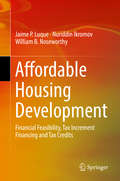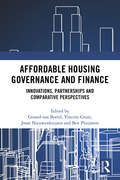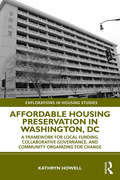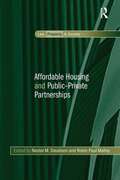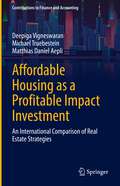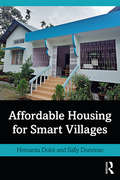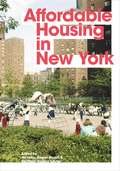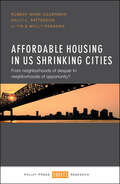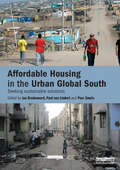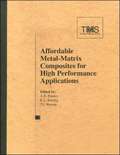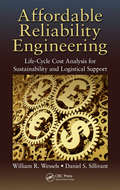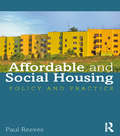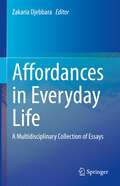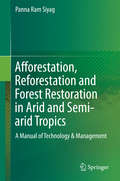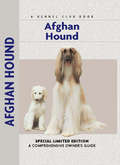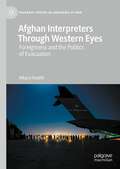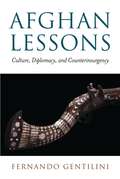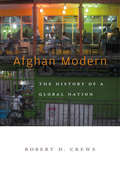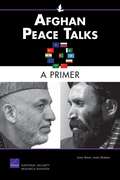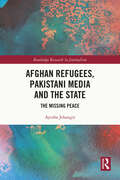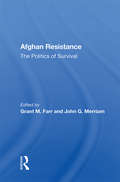- Table View
- List View
Affordable Housing Development: Financial Feasibility, Tax Increment Financing and Tax Credits
by Jaime P. Luque Nuriddin Ikromov William B. NoseworthyThis book explains the nuts and bolts of affordable housing development. Divided into two complementary sections, the book first provides an overview of the effectiveness of existing federal and state housing programs in the United States, such as the LIHTC and TIF programs. In turn, the book’s second section presents an extensive discussion of and insights into the financial feasibility of an affordable real estate development project. Researchers, policymakers and organizations in the public, private and nonprofit sectors will find this book a valuable resource in addressing the concrete needs of affordable housing development. “Luque, Ikromov, and Noseworthy’s new book on Affordable Housing Development is a “must read” for all those seeking to address the growing and vexing problem of affordable housing supply. The authors provide important insights and practical demonstration of important financial tools often necessary to the financial feasibility of such projects, including tax-increment financing and the Low-Income Housing Tax Credit. Further, the authors provide important backdrop to the affordability crisis and homelessness. I highly recommend this book to all who seek both to articulate and enhance housing access.” By Stuart Gabriel, Arden Realty Chair, Professor of Finance and Director, Richard S. Ziman Center for Real Estate at UCLA"Over several years Jaime Luque, Nuriddin Ikromov and William Noseworthy applied their analytical bent, and no small measure of empathy, to homelessness as actually experienced in Madison, Wisconsin – and they inspired multiple classes of urban economics students to join them. “Homelessness” is a complex web of issues affecting a spectrum of populations, from individuals struggling with addiction or emotional disorders, to families who’ve been dealt a bad hand in an often-unforgiving economy. Read this book to follow Jaime, Nuriddin, and William as they evaluate a panoply of housing and social programs, complementing the usual top-down design perspective with practical analysis of the feasibility of actual developments and their effectiveness. Analytical but written for a broad audience, this book will be of interest to anyone running a low-income housing program, private and public developers, students, and any instructor designing a learning-by-doing course that blends rigor with real-world application to a local problem."By Stephen Malpezzi, Professor Emeritus, James A. Graaskamp Center for Real Estate, Wisconsin School of Business, University of Wisconsin-Madison, and Dean, Weimer School of the Homer Hoyt Institute.
Affordable Housing Governance and Finance: Innovations, partnerships and comparative perspectives
by Vincent Gruis Joost Nieuwenhuijzen Ben Pluijmers Gerard BortelThere is a large shortage of affordable housing across Europe. In high‐demand urban areas housing shortages lead to unaffordable prices for many target groups. This book explores innovations to support a sufficient supply of affordable and sustainable rental housing. Affordable housing is increasingly developed, financed and managed by a mix of market, state, third sector and community actors. Recent decades in large parts of the Western world have consecutively shown state-dominated, non-profit housing sectors, an increased role for market forces and the private sector, and the rise of initiatives by citizens and local communities. The variety of hybrid governance and finance arrangements is predicted to increase further, leading to new affordable housing delivery and management models. This book explores these innovations, with a focus on developments across Europe, and comparative chapters from the USA and Australia. The book presents new thinking in collaborative housing, co-production and accompanying finance mechanisms in order to support the quantity and the quality of affordable rental housing. Combining academic robustness with practical relevance, chapters are written by renowned housing researchers in collaboration with practitioners from the housing sector. The book not only presents, compares and contrasts affordable housing solutions, but also explores the transferability of innovations to other countries. The book is essential reading for researchers and professionals in housing, social policy, urban planning and finance.
Affordable Housing Preservation in Washington, DC: A Framework for Local Funding, Collaborative Governance and Community Organizing for Change (Explorations in Housing Studies)
by Kathryn HowellAffordable Housing Preservation in Washington, DC uses the case of Washington, DC to examine the past, present, and future of subsidized and unsubsidized affordable housing through the lenses of history, governance, and affordable housing policy and planning. Affordable housing policy in the US has often been focused at the federal level where the laws and funding to build new affordable housing historically have been determined. However, as federal housing subsidies from the 1960s expire and federal funding continues to decline, local governments, tenants and advocates face the difficult challenge of trying to retain affordability amid increasing demand for housing in many American cities. Now, instead of amassing land, financing and sponsors, affordable housing stakeholders must understand the existing resident needs and have access to the market for affordable housing. Arguing for preservation as a way of acknowledging a basic right to the city, this book examines the ways that the broad range of stakeholders engage at the building and city levels. This book identifies the underlying challenges that enable or constrain preservation to demonstrate that effective preservation requires long-term relationships that engage residents, build trust and demonstrate a willingness to share power among residents, advocates and the government. It is of great interest to academics and students as well as policy makers and practitioners internationally in the fields of housing studies and policy, urban studies, social policy, sociology and political economy.
Affordable Housing and Low Income Housing Tax Credits in the United States
by Nicolas P. Retsinas Arthur I SegelIndustry and Background Note
Affordable Housing and Public-Private Partnerships (Law, Property and Society)
by Nestor M. DavidsonWith distressing statistics about rising cost burdens, increasing foreclosure rates, rising unemployment, falling wages, and widespread homelessness, building affordable housing is one of our most pressing social policy problems. Affordable Housing and Public-Private Partnerships focuses attention on this critical need, as leading experts on affordable housing law and policy come together to address key issues of concern and to suggest appropriate responses for future action. Focusing in particular on how best to understand and implement the joint work of public and private actors in housing, this book considers the real estate aspects of affordable housing law and policy, access to housing, housing finance and affordability, land use, housing regulation and housing issues in a post-Katrina context. Filling a critical gap in the scholarly literature available, this book will be of particular interest to policy-makers, academics, lawyers and students of housing, land use, real estate, property, community development and urban planning
Affordable Housing as a Profitable Impact Investment: An International Comparison of Real Estate Strategies (Contributions to Finance and Accounting)
by Matthias Daniel Aepli Deepiga Vigneswaran Michael TruebesteinThe challenges of affordable housing are manifold. However this presents an opportunity to private investors, real estate companies, and developers. With the growing global trend for impact-based investments, many institutional investors have begun to consider the merits of this asset class. This book examines not only the profitability of these assets, but also whether these assets rely on government subsidy. It discusses why investors have become more interested in this product and which investment criteria influence the financial performance of these assets. The authors employed a mixed method approach to collect data at two tiers, first through surveys and afterwards through interviews of 8 firms (3 publicly listed companies, 3 private equity companies, 1 foundation, and 1 state bank) across Germany, the United Kingdom, and the United States. Investment criteria are analyzed using inferential statistics, specifically the Hierarchical Algorithm Cluster Analysis. The financial characteristics of the companies are examined and compared using descriptive statistics and the qualitative interview output is explored using the thematic Latent Coding Analysis. Furthermore, the book explains how the bond-like nature of affordable housing is a profitable impact investment option, and how this strategy is particularly worthwhile for institutional investors. It also describes that profitability of affordable housing products is not dependent on subsidy. Still, affordable housing products supported by government incentives in the United Kingdom and United States are most attractive. The book illustrates six important investment strategies identified by veterans in this field to have an influence on the financial feasibility of affordable housing products.
Affordable Housing for Smart Villages
by Sally Donovan Hemanta DoloiThis book initiates a fresh discussion of affordability in rural housing set in the context of the rapidly shifting balance between rural and urban populations. It conceptualises affordability in rural housing along a spectrum that is interlaced with cultural and social values integral to rural livelihoods at both personal and community level. Developed around four intersecting themes: explaining houses and housing in rural settings; exploring affordability in the context of aspirations and vulnerability; rural development agendas involving housing and communities; and construction for resilience in rural communities, the book provides an overview of some of the little understood and sometimes counter-intuitive best practices on rural affordability and affordable housing that have emerged in developing economies over the last thirty years. Drawing on practice-based evidence this book presents innovative ideas for harnessing rural potential, and empowering rural communities with added affordability and progressive development in the context of housing and improved living standards. For a student aspiring to work in rural areas in developing countries it is an introduction to and map of some key solutions around the critical area of affordable housing For the rural development professional, it provides a map of a territory they rarely see because they are absorbed in a particular rural area or project For the academic looking to expand their activities into rural areas, especially in rural housing, it provides a handy introduction to a body of knowledge serving 47% of the world's population, and how this differs from urban practice For the policy makers, it provides a map for understanding the dynamics around rural affordability, growth potential and community aspirations helping them to devise appropriate intervention programs on rural housing and development
Affordable Housing in New York: The People, Places, and Policies That Transformed a City
by Nicholas Dagen Bloom Matthew Gordon LasnerA richly illustrated history of below-market housing in New York, from the 1920s to todayA colorful portrait of the people, places, and policies that have helped make New York City livable, Affordable Housing in New York is a comprehensive, authoritative, and richly illustrated history of the city's public and middle-income housing from the 1920s to today. Plans, models, archival photos, and newly commissioned portraits of buildings and tenants by sociologist and photographer David Schalliol put the efforts of the past century into context, and the book also looks ahead to future prospects for below-market subsidized housing. A dynamic account of an evolving city, Affordable Housing in New York is essential reading for understanding and advancing debates about how to enable future generations to call New York home.
Affordable Housing in US Shrinking Cities: From Neighborhoods of Despair to Neighborhoods of Opportunity?
by Robert Mark Silverman Kelly L. PattersonGiven the rapid urbanisation of the world’s population, the converse phenomenon of shrinking cities is often overlooked and little understood. Yet with almost one in ten post-industrial US cities shrinking in recent years, efforts by government and anchor institutions to regenerate these cities is gaining policy urgency, with the availability and siting of affordable housing being a key concern. This is the first book to look at the reasons for the failure (and success) of affordable housing experiences in the fastest shrinking cities in the US. Applying quantitative and GIS analysis using data from the US Department of Housing and Urban Development, the authors make recommendations for future place-based siting practices, stressing its importance for ensuring more equitable urban revitalisation. The book will be a valuable resource for academic researchers and students in urban studies, housing and inequality, as well as policy makers.
Affordable Housing in the United States
by Gregg Colburn Rebecca J WalterAffordable Housing in the United States addresses the issue of affordability of housing, or the lack thereof, going beyond conventional policy discussions to consider fundamental questions such as: What makes housing affordable and for whom is it affordable? What are the consequences of a lack of affordable housing? How is affordable housing created? And what steps can be taken to ensure all people have access to affordable housing?With the understanding that different households face different challenges, the book begins by breaking down the variables relevant to the study of affordable housing, including housing costs, household income, geographic location, and market forces, to help readers understand and quantify affordability at the individual and societal level. Part II examines the consequences of unaffordable housing, highlighting racial inequities in housing access and affordability, and multiple forms of housing precarity including eviction and homelessness. Part III explores the entities involved in providing affordable housing such as local and federal governments, regulatory agencies, non-profit organizations, and for-profit developers. In Part IV, case studies from US cities demonstrate the complex web of organizations, policies, and market conditions that influence housing affordability, revealing substantial regional variations in access and policy response. Part V proposes a future roadmap and outlines four potential states with radically different outcomes for the affordable housing system in the United States.An ideal book for graduate and undergraduate courses in economics, public policy, real estate finance and development, sociology, and urban planning, this title will also be of value to professionals and policymakers seeking to understand and improve housing affordability and access.
Affordable Housing in the Urban Global South: Seeking Sustainable Solutions
by Peer Smets Jan Bredenoord Paul Van LindertThe global increase in the number of slums calls for policies which improve the conditions of the urban poor, sustainably. This volume provides an extensive overview of current housing policies in Asia, Africa and Latin America and presents the facts and trends of recent housing policies. The chapters provide ideas and tools for pro-poor interventions with respect to the provision of land for housing, building materials, labour, participation and finance. The book looks at the role of the various stakeholders involved in such interventions, including national and local governments, private sector organisations, NGOs and Community-based Organisations.
Affordable Interior Design: High-End Tips for Any Budget
by Betsy Helmuth Dov PlawskyLive in luxury—on a budget. Homeowners and renters of all means dream of having a beautiful home. The media makes it look so easy, but many of us have less to work with and still long to live in style. Affordable Interior Design makes luxury an affordable reality. In this DIY home decorating handbook, Helmuth reveals insider tips and her tried-and-tested methods for choosing colors, creating a gallery wall, how to use accent tables, entry benches, rugs, and more! Helmuth has shared her affordable design advice and step-by-step approaches with millions through live teaching workshops, guest columns, television appearances, and interviews. Now, she has distilled her expertise into this practical guide. The chapters follow her secret design formula and include creating a design budget, mapping out floor plans, selecting a color palette, and accessorizing like a stylist. It’s time to start living in the home of your dreams without maxing out your credit cards. Learn how with Affordable Interior Design!
Affordable Metal Matrix Composites for High Performance Applications II
by Sandeep R. Shah John Lewandowski Kevin L. Kendig Awadh B. PandeyThis book will include papers on recent research carried out in the field of metal-matrix composites (MMCs). Processing, microstructure, and mechanical properties of MMCs and unreinforced matrix alloys will be covered with a focus on aluminum, titanium, nickel, and copper MMCs. Those involved in the research of MMCs and unreinforced alloys, particularly in aerospace, space, and automotive materials research, will find this volume indispensible.From Materials Science & Technology 2003 to be held in Chicago, Illinois, November 9-12, 2003.
Affordable Reliability Engineering: Life-Cycle Cost Analysis for Sustainability & Logistical Support
by William R. Wessels Daniel SillivantHow Can Reliability Analysis Impact Your Company's Bottom Line?While reliability investigations can be expensive, they can also add value to a product that far exceeds its cost. Affordable Reliability Engineering: Life-Cycle Cost Analysis for Sustainability & Logistical Support shows readers how to achieve the best cost for design develo
Affordable and Social Housing: Policy and Practice
by Paul ReevesAffordable and Social Housing - Policy and Practice is a candid and critical appraisal of current big-ticket issues affecting the planning, development and management of affordable and social housing in the United Kingdom. The successor to the second edition of the established textbook An Introduction to Social Housing, the book includes new chapters, reflecting the focal importance of customer involvement and empowerment, regeneration and the Localism agenda which will have radical impacts on housing provision and tenure, as well as the town and country planning system which enables its development. There is also a new chapter on Housing Law in response to demand for a clear and signposting exposition of this often complex area. Reeves indicates how each theme affects the other, and suggests policy directions on the basis of past successes and failures. Paul Reeves takes a people-centred approach to the subject, describing the themes that have run through provision of social housing from the first philanthropic industrialists in the 19th Century though to the increasingly complex mixture of ownerships and tenures in the present day. The book is ideal for students of housing and social policy, and for housing professionals aiming to obtain qualifications and wanting a broad understanding of the social housing sector.
Affordances in Everyday Life: A Multidisciplinary Collection of Essays
by Zakaria DjebbaraThe concept of affordances is being increasingly used in fields beyond ecological psychology to reveal previously unexplored interdisciplinary relationships. These fields include engineering, robotics, artificial intelligence, neuroscience, urban theory, architecture, computer science, and much more. As the concept is adapted for its relational meaning between an agent and the environment, or object, the meaning of the term has changed to fit the customs of the adapting field. This book maps the different shades of the term and brings insights into how it is operationalized by providing short accessible essays regardless of background. Each contribution addresses big questions around this topic such as the application of the concept on ongoing research, how to measure or identify affordances, as well as other reflective questions about the future of affordances in the field. The book is envisioned to be read by non-experts, students, and researchers from several disciplines, and fills the need for summarization across disciplines. As the many adaptations flourished from the same psychological concept, this book also aims to function as a catalyst and motivation for reinterpreting the concepts for new directions. Compared to existing books, this book aims not to span the vertical dimension of field by taking a deep dive into a niche-field—instead, this book aims to have a wide horizontal span highlighting a common concept shared by an increasing number of fields, namely affordances. As such, this book takes a different approach by attempting to summarize the different emerging applications and definitions of the concept, and make them accessible to non-experts, students, and researchers regardless of background and level.
Afforestation, Reforestation and Forest Restoration in Arid and Semi-arid Tropics: A Manual of Technology & Management
by Panna Ram SiyagThe book is a comprehensive manual of practice for execution of afforestation and tree planting programmes in arid and semi-arid tropics. It includes a compact running account of the technology of afforestation and the relevant principles and practices in management of afforestation projects. It provides a wide range of structured information and a number of model designs which can be gainfully put to use by the field level supervisors as also by the managers concerned with planning and control of such projects. Written by a practising specialist, the book is invaluable for anyone concerned with the practice of afforestation and tree planting, be he a tree hobbyist or a school teacher, a professional forester or a senior policy maker in government, an industrialist or a philanthropist, an environmental activist or a member of a community service organization.
Afghan Hound
by Bryony Harcourt-BrownThis Comprehensive Owner's Guide to the Afghan Hound serves as a complete introduction to the world's most elegant sighthound breed. A native of Afghanistan, the exotic Afghan Hound with its abundant, long coat, near-human expression, and superb hunting ability has been a favorite breed in the Western world since the breed was first imported to England in the 1920s and a decade later in the United States. Written by British Afghan enthusiast Bryony Harcourt-Brown, the book begins with a solid chapter on the breed's history, tracing its origins in the Middle East, its development in America and the United Kingdom, illustrated with historical dogs and important show winners. The chapters on characteristics and the breed standard encapsulate all of the virtues of this impressive hound breed, offering sound advice about which owners are best suited to the breed.New owners will welcome the well-prepared chapter on finding a breeder and selecting a healthy, sound puppy. Chapters on puppy-proofing the home and yard, purchasing the right supplies for the puppy as well as house-training, feeding, and grooming are illustrated with handsome Afghan adults and puppies bursting with personality! In all, there are over 135 photographs in this compact, useful, and entertaining volume. The author's advice on obedience training the Afghan Hound, a breed that has a strong mindset and doesn't relish pleasing his owners, will help readers better mold and train their dogs into the most socialized, well-mannered Afghans in the neighborhood. The extensive chapter on healthcare written by Dr. Lowell Ackerman provides up-to-date detailed information on selecting a qualified veterinarian, vaccinations, parasites, infectious diseases, and more. Sidebars throughout the text offer helpful hints, covering topics as diverse as historical kennels, toxic plants, first aid, crate training, carsickness, fussy eaters, and parasite control. Fully indexed.
Afghan Interpreters Through Western Eyes: Foreignness and the Politics of Evacuation (Palgrave Studies in Languages at War)
by Hilary FootittThis book explores how endangered local interpreters in Afghanistan were seen through Western eyes in the period from 2014, when the West drew down the bulk of its military forces, to the summer of 2021, when NATO forces withdrew completely. The author examines how these interpreters were understood and represented by Western governments, militaries, agencies, press and lobby organisations, how the understandings changed over time, and to what extent the representations reflect distinct rationales for intervention/historic relationships with Afghanistan, specific immigration and anti-terrorism policies, and notions of citizenship. The book will be of interest to students and scholars of translation and interpreting, history, war studies, and migration studies.
Afghan Lessons
by Angela Arnone Fernando GentiliniFernando Gentilini served nearly two years as the civilian representative of NATO in Afghanistan, running a counterinsurgency campaign in the wartorn nation. Afghan Lessons is the fascinating story of his mission, a firsthand view of Afghanistan through a kaleidoscope. He explores Afghan history, literature, tradition, and culture to understand some of the most basic questions of Western involvement: What is the purpose? What does an international presence mean, and how can it help?Highlights from Afghan Lessons"This is a book about different worlds, different realities. The reality of everyday life in an unreal world. People that need to be looked after, jobs that need to be done, a country that needs to be restored, all from within the necessary confines of an armed camp. And this in the middle of another reality, which we do not understand, full of things forgotten under decades of war. The keys to this reality lie in the past, perhaps lost." --from the Foreword by Robert Cooper"To tempt me to explore their country, the Afghans kept repeating that there were three different Afghanistans: 'The first is the one you Westerners imagine; another coincides with the city of Kabul; the third is the country of remote provinces, far away from the cities, and of the three, this is the only real Afghanistan.'""'There can be no development without security and no security without development.' ... Everyone said it over and over again, both the civilians and the military, but depending on whether it was said by the former or the latter, the emphasis was placed on the first or second part of the slogan. In all honesty this seemingly obvious concept concealed two contrasting ways of seeing things."
Afghan Lessons
by Fernando GentiliniFernando Gentilini served nearly two years as the civilian representative of NATO in Afghanistan, running a counterinsurgency campaign in the wartorn nation. Afghan Lessons is the fascinating story of his mission, a firsthand view of Afghanistan through a kaleidoscope. He explores Afghan history, literature, tradition, and culture to understand some of the most basic questions of Western involvement: What is the purpose? What does an international presence mean, and how can it help?Highlights from Afghan Lessons"This is a book about different worlds, different realities. The reality of everyday life in an unreal world. People that need to be looked after, jobs that need to be done, a country that needs to be restored, all from within the necessary confines of an armed camp. And this in the middle of another reality, which we do not understand, full of things forgotten under decades of war. The keys to this reality lie in the past, perhaps lost." -from the Foreword by Robert Cooper"To tempt me to explore their country, the Afghans kept repeating that there were three different Afghanistans: 'The first is the one you Westerners imagine; another coincides with the city of Kabul; the third is the country of remote provinces, far away from the cities, and of the three, this is the only real Afghanistan.'""'There can be no development without security and no security without development.' ... Everyone said it over and over again, both the civilians and the military, but depending on whether it was said by the former or the latter, the emphasis was placed on the first or second part of the slogan. In all honesty this seemingly obvious concept concealed two contrasting ways of seeing things."
Afghan Modern: The History of a Global Nation
by Robert D. Crews<p>Rugged, remote, riven by tribal rivalries and religious violence, Afghanistan seems to many a country frozen in time and forsaken by the world. Afghan Modern presents a bold challenge to these misperceptions, revealing how Afghans, over the course of their history, have engaged and connected with a wider world and come to share in our modern globalized age. <p>Always a mobile people, Afghan travelers, traders, pilgrims, scholars, and artists have ventured abroad for centuries, their cosmopolitan sensibilities providing a compass for navigating a constantly changing world. Robert Crews traces the roots of Afghan globalism to the early modern period, when, as the subjects of sprawling empires, the residents of Kabul, Kandahar, and other urban centers forged linkages with far-flung imperial centers throughout the Middle East and Asia. Focusing on the emergence of an Afghan state out of this imperial milieu, he shows how Afghan nation-making was part of a series of global processes, refuting the usual portrayal of Afghans as pawns in the “Great Game” of European powers and of Afghanistan as a “hermit kingdom.” <p>In the twentieth century, the pace of Afghan interaction with the rest of the world dramatically increased, and many Afghan men and women came to see themselves at the center of ideological struggles that spanned the globe. Through revolution, war, and foreign occupations, Afghanistan became even more enmeshed in the global circulation of modern politics, occupying a pivotal position in the Cold War and the tumultuous decades that followed.</p>
Afghan Peace Talks
by James Dobbins James ShinnThe objective of a negotiated peace in Afghanistan has been firmly embraced by most of the potential parties to a treaty. However, arriving at an agreement about the sequencing, timing, and prioritization of peace terms is likely to be difficult, given the divergence in the parties' interests and objectives. The U.S. objective in these negotiations should be a stable and peaceful Afghanistan that neither hosts nor collaborates with terrorists.
Afghan Refugees, Pakistani Media and the State: The Missing Peace (Routledge Research in Journalism)
by Ayesha JehangirDrawing on the frameworks of peace journalism, this book offers new insights into the Pakistani media coverage of Afghan refugees and their forced repatriation from Pakistan. Based on a three-year-study, the author examines the political, social and economic forces that influence and govern the reporting practices of journalists covering the protracted refugee conflict between Pakistan and Afghanistan. Through a critical discourse analysis of the structures of journalistic iterability of Afghan refugees in Pakistan, the author distils four dominant and three emerging frames, and proposes a new teleological turn for peace journalism as deliberative practice, that is to say practice that by promoting transparency and accountability (recognition) and challenging dominant power-proposed narratives and perspectives (resistance) encourages public engagement and participation (cosmopolitan solidarity). The author also privileges an analytical approach that conceptualises the nexus between digital witnessing and peace journalism through the paradigm of cosmopolitanism. The author finds routinely accommodated media narratives of security that represent Afghan refugees as a ‘threat’, a ‘burden’ and the ‘other’ that, through reinforcement, have become an incontestable reality for the public in Pakistan. This book will appeal to those interested in studying and practicing journalism as a conscientious communicative practice that elicits the very public it seeks to inform.
Afghan Resistance: The Politics Of Surivival
by Grant M. Farr John G. MerriamThe people of Afghanistan stand at a crossroads, with resistance to the Soviet occupation entering its eighth year. The question of survival must be weighed against the difficult political choices of fighting or reaching an accommodation with the Soviet-backed Kabul regime. The vast majority choose to continue the struggle--aided in part by covert arms shipments--and to search for a uniquely Afghan nationalism despite rumors of an impending USSR-U.S. deal whereby, in return for Soviet troop withdrawal and cessation of arms aid to the Mujahideen, Afghanistan and Pakistan would become neutral Muslim nations. Drawing on Afghan cultural and historical background, this collection of original essays provides fresh insights into the nature of the Afghan conflict, the country's threatened national infrastructure, the continuing decimation of its citizens, and the prospects for their survival. Showing that popular resistance is not limited to the Mujahideen, or freedom fighters, but encompasses the Afghan people as a whole, the contributors examine the impact of the world's largest refugee population on the shape of the future Afghanistan. Based on their extensive firsthand experience in the region, the contributors provide an interdisciplinary analysis of a country, a people, and a war still too little known to the outside world.
